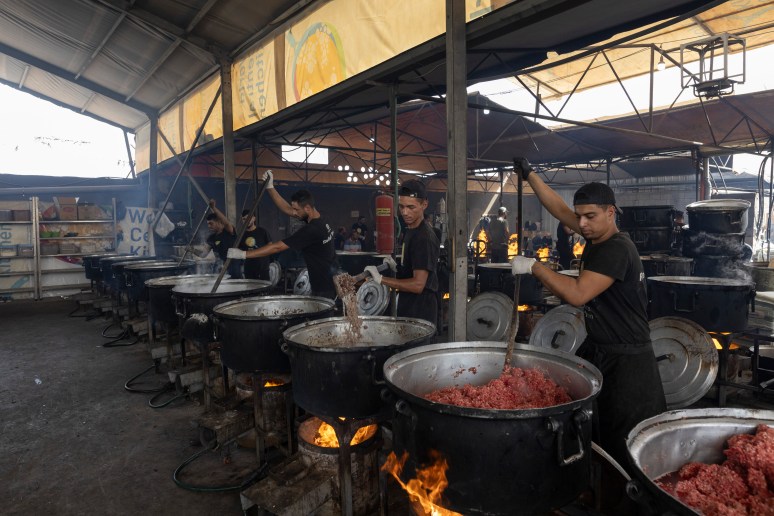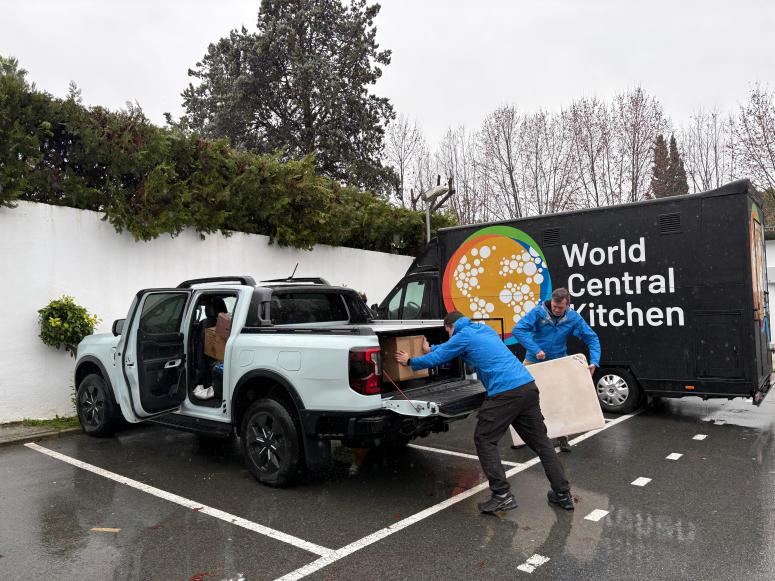Meet WCK’s Emergency Response Team in Ukraine

The invasion of Ukraine continues to impact millions of people, and attacks on civilian homes and infrastructure are expected to intensify as Russia’s spring offensive continues. World Central Kitchen’s Emergency Response Team is dedicated to working tirelessly to offer critical and immediate support to civilians impacted by Russian missile and artillery strikes. Our Emergency Response Team has served thousands of meals alongside local partners to support communities following an attack.
A lot of planning and coordination goes into ensuring meals reach people in need as quickly as possible following an attack. We invite you to come behind the scenes with our Emergency Response Team to learn how WCK supports communities affected by Russian strikes. Through these stories, you’ll gain insight into the challenges our team faces in Ukraine to meet the unique needs of each community.

WCK’s Emergency Response Team was born out of necessity following an intense period of missile attacks over the course of October and November of last year. Our teams across the country saw there was a need to create the systems that would allow WCK to support communities as quickly as possible in the aftermath of an attack. “Dozens of missiles hit critical infrastructure and civilian buildings every week, and many civilians suffered. Before that, this emergency support was carried out by local coordinators with restaurant partners. But October made it clear that we had to create a separate structure for this and prepare better because our help was needed almost every week,” said Vasyl, who served as WCK’s Emergency Response Lead until late March 2023.
Vasyl, former Emergency Response Lead
“We categorize the emergency actions into three types. The first type is a missile attack that results in the destruction of civilian buildings with casualties. In such situations, we provide food aid quickly and support the civilians and rescuers working on-site. It is not just regular food delivery, but a rapid response,” said Vasyl. “The second type is a critical situation that arises due to missile attacks, such as blackouts or train delays. Lastly, we consider the de-occupation and liberation of new territories emergencies that require us to deliver food aid to the civilian population as quickly as possible.”
Oleksiy, Emergency Response Regional Coordinator
Our team has developed strategies to meet unique needs as they arise. One way we accomplish this is by preparing different forms of food aid. When responding to emergencies, having diverse delivery methods is crucial. Oleksiy—one of our emergency response regional coordinators—explains: “We need to be able to move quickly and efficiently, so the first stage is all about providing quick food options that can easily be transported to the affected areas.” This includes dehydrated food, soups, and other non-perishable items that can be a quick solution to feed people in need. However, Oleksiy stresses that “it’s also important to offer hot meals to those who have been impacted by the emergency, so we make sure to provide fresh, warm meals later as well.” This two-stage approach ensures the WCK team can meet the immediate needs of people impacted by an attack, while also providing more substantial and comforting meals in the hours and days following the emergency.
Anton, Emergency Response Regional Coordinator (right)
Our Emergency Response Team is known for arriving on the scene quickly, fully prepared to provide support. This is made possible by the team’s high level of preparedness and organization. Anton, an emergency response regional coordinator, credits the team’s success to the following: “First, we establish contacts with the first responders, and we get all the information very quickly. This helps us to respond immediately to the situation. Second, we don’t have to pack because we have everything prepared in advance. We have a well-developed scheme of how we should act in each city, and everything is sorted into cases, which allows us to get ready to head out in just a couple of minutes. Every person in every city knows what to load into the car and how to put it there. It may sound trivial, but it makes a huge difference in our response time.” With all these elements in place, the team can gather supplies and personnel to begin distributing food as quickly as possible.
Inna, Emergency Local Coordinator in Kharkiv
Inna, our local coordinator in Kharkiv, believes this level of preparation is what allows the team to reach impacted neighborhoods within minutes. “Our team works seamlessly together, and we have a clear division of tasks, from communication with first responders to food delivery. The last time there was an explosion in Kharkiv, we were at the location in 30 minutes with water and sandwiches because everything is structured and everyone knows exactly what to do,” she said.
Serhii, Emergency Local Coordinator in Kramatorsk
In Kramatorsk, the local team has implemented the same systems to act quickly. “My city, Kramatorsk, is not big. It takes 10-15 minutes to get to the site. First, we go to see the site of the missile attack ourselves and make a decision on whether to come with the food. We have our team members in Kostyanynivka so we can quickly react in that part of the region, too,” Serhii, our local emergency response coordinator, noted about the team’s capabilities.
Being an emergency response coordinator in a war zone can be a harrowing experience, and for Anton, the hardest moment came on the third day of our response to the January attacks on Dnipro. “First, they found a woman with a dangerously low body temperature and took her to the intensive care unit, but her one-year-old child was left under the debris,” he recalled. “And I stood there for a very long time looking at that exact spot, waiting for the child to be taken out alive. Unfortunately, no miracle happened. This is the hardest thing for me in my work when it happens to children.” The woman lost her entire family that day—parents, child, and husband. “It was the hardest day for me during the war. I did not leave the location for the first two days, and after that day it was the first time I left at night. After what I saw, I decided to visit my child for the night, and at 5am I went back to Dnipro.”
Despite the emotional toll, Anton is motivated by his family. “My family is now in Kharkiv, they returned from Germany because it’s hard for a child to be without a father, and I worry about them a lot, always. My child is the biggest motivation for me.”
Denys, Emergency Local Coordinator in Zaporizhzhia
“We have a really difficult job, both mentally and physically,” said Denys, WCK’s local coordinator in Zaporizhzhia. From rigorous training to self-care practices, team leaders take a holistic approach to ensure WCK team members are ready for the challenges they may face. “We limit one person to 8–10 hours of work and work in shifts. Now we have a rather permanent team, and these are the people who are ready to work in such difficult conditions.” By prioritizing the well-being of members, the team is better equipped to support communities affected by crises. “People need not only food but also support. In such moments, we have to be stress-resistant but still treat people with kindness,” Denys added.

People need not only food but also support. In such moments, we have to be stress-resistant but still treat people with kindness.
Denys
Emergency Local Coordinator in Zaporizhzhia
“The task of our team is not just to hand out tea like in a convenience store. Volunteers at the location communicate with the affected people and support them,” Anton noted. Team members take the time to listen to the people’s stories and offer a shoulder to lean on, and at times even cry on. They are trained to recognize signs of distress and, if necessary, can contact a mental health specialist. Sometimes, a simple act of kindness like offering a warm blanket or a comforting hug can make a significant difference. “These are all basic things: you approach, cover this person with a blanket, hug them, and offer a hot cup of tea. And the person immediately feels better because they realize that they are not alone,” assured Anton.

These are all basic things: you approach, cover this person with a blanket, hug them, and offer a hot cup of tea. And the person immediately feels better because they realize that they are not alone.
Anton
Emergency Response Regional Coordinator
WCK’s response to the crisis is rooted in one simple concept: this is an effort of Ukranians feeding Ukrainians. Local team members know what people receiving meals are going through because they too have lived through similar experiences. “When we arrive, we see the emptiness in people’s eyes. It’s their whole lives, people have been picking up pieces of their homes, and at one point they have nothing left,” said Serhii, adding that “people are left without any support and it is very difficult.” Serhii knows firsthand the importance of being there for people in a time of crisis. “Once when I came to Lviv for a team gathering, there were two missile attacks near my house in Kramatorsk, and my mother was there alone. I tried to support her in every way possible, but it’s really hard to do from a distance. So I know exactly how important it is to be there in a difficult moment.”
Despite these risks, Inna remains undaunted, driven by a deep sense of purpose and a commitment to serving Ukrainians in need. “In these difficult times, I, like every person in the country, face many fears and challenges,” she says. “At the same time, I want to be useful and contribute to bringing peace to the Ukrainian land.” Her bravery and dedication have earned her the respect and admiration of her colleagues, who see her as a role model, a strong example of working with both courage and compassion. For her, this work is not just a job, but a calling, and she feels privileged to be able to make a difference in the lives of those affected by the crisis.
Courtney, Emergency Response Lead (second from left)
“At the end of the day, this is a story about the unwavering fortitude of Ukrainian spirit which remains undiminished in each and every member of our team as they continue to show remarkable bravery and strength, offering support to their fellow citizens through the most horrific moments of their lives while they continue to personally navigate the effects of this war on themselves, their families, and their friends,” stressed Courtney, who took over as Emergency Response Lead from Vasyl.
“Moving forward, we will continue to prioritize the safety and well-being of our team, as we advance and build upon our operational capabilities to ensure we are able to continue to provide much-needed support to people affected by isolated attacks, blackouts, and to families living in previously occupied territories, as safely, effectively, and efficiently as possible,” she concluded.
Learn more about our #ChefForUkraine response here. For real-time updates, follow WCK on Twitter, Instagram, and Facebook. You can support our work by making a donation here.











